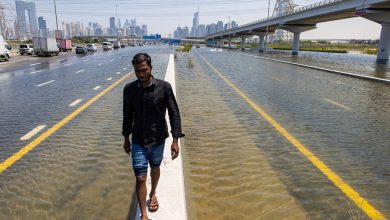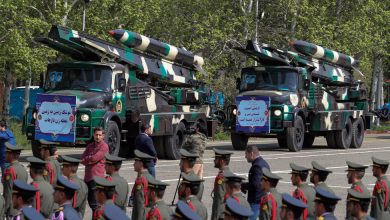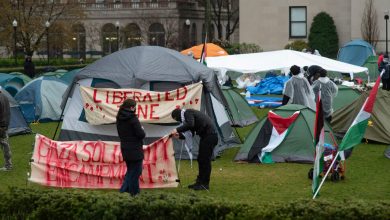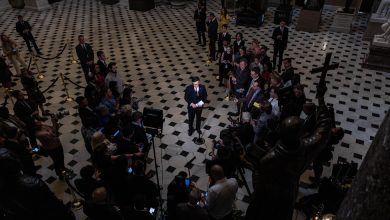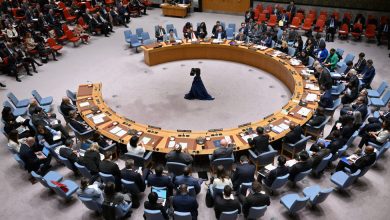Your Monday Briefing


Smoke rising in Kyiv, Ukraine, after explosions were heard early yesterday morning.Credit…Nicole Tung for The New York Times
Russia bombs Kyiv
At least five missiles hit Kyiv early yesterday, the first Russian strike in Ukraine’s capital in over a month. Russia said the missiles destroyed tanks and armored vehicles supplied by Ukraine’s Eastern European allies. At least one person was injured, officials said.
The attack, after 100 days of war, came as Russia’s president, Vladimir Putin, warned that Moscow would hit targets it had so far avoided if Western nations began delivering longer-range missiles to Ukraine. Follow the latest updates from the war.
The U.S. has warned that the Kremlin is trying to profit from its bombing and plundering of Ukraine’s grain production by selling stolen wheat to drought-stricken countries in Africa. Those countries potentially face a hard choice between displeasing a powerful Western ally and refusing cheap food at a time when wheat prices are soaring and hundreds of thousands of people are starving.
The east: Combat continued to rage around the contested city of Sievierodonetsk. Powerful explosions were also heard in and around Kramatorsk, the capital of Ukrainian-controlled areas of the Donetsk region.
Other updates:
-
A Ukrainian official angrily rejected a plea from President Emmanuel Macron of France not to “humiliate” Russia and to instead seek a negotiated settlement.
-
Russia has arrested thousands of its citizens, as the Kremlin cracks down on criticism of its war.
For Britons, Jubilee offers a brief respite
Millions of Britons wrapped up a joyful four-day tribute to Queen Elizabeth II and her 70-year reign. Yet the brief, sweet pleasures of a long weekend in late spring belied a national mood that has been rather sour as the country faces political ruptures and worries of stagflation, the double-whammy of recession and inflation.
A long-simmering scandal over lockdown-breaking parties at 10 Downing Street threatens to boil over: On Friday, boos drowned out cheers as Boris Johnson, the prime minister, entered St. Paul’s Cathedral for a service of thanksgiving for the queen. He may face a no-confidence vote as soon as this week, according to reports in the British media.
Even if Johnson survives the vote, some predict he will face a winter of misery, as the country deals with surging food and fuel prices. The International Monetary Fund estimated last month that consumer prices would soar 13 percent this year and next. Other forecasters said a recession was unavoidable.
Jubilee appearance: The queen, clad in green, emerged on the balcony at Buckingham Palace yesterday — one of two such appearances during the celebration — after missing most of the festivities because of trouble walking. At a concert the night before, she stole the show with a prerecorded sequence with Paddington Bear, voiced by the actor Ben Whishaw.
Biden’s ‘bad options’ for bringing down oil prices
President Biden’s planned meeting this summer with Mohammed bin Salman, the crown prince of Saudi Arabia, is just the latest sign that oil has again regained its centrality in geopolitics.
Biden has few tools to bring down costs at the pump, especially when Russia, one of the world’s largest energy producers, has started an unprovoked war against a smaller neighbor. Two other oil-producing countries that could increase production — Iran and Venezuela — have largely been cut out of the global market by Western sanctions.
The U.S. is the world’s biggest oil and natural gas producer, but it accounts for only about 12 percent of the global petroleum supply. The price of oil can still shoot up or tumble depending on events halfway around the world. And when fuel prices rise, consumers can turn against presidents who seem unwilling or unable to bring them back down.
Analysis: “A president has to try,” said Bill Richardson, an energy secretary in the Clinton administration. “Unfortunately, there are only bad options. And any alternative options are probably worse than asking the Saudis to increase production.”
THE LATEST NEWS
Around the World
-
Dozens are believed to have died after assailants attacked a Catholic church in southwestern Nigeria yesterday, firing on worshipers as they celebrated Mass.
-
A fire at a container depot in Bangladesh set off explosions that killed at least 49 people and injured hundreds more.
-
North Korea conducted its 18th weapons test of the year yesterday, launching a barrage of short-range missiles toward the waters off its east coast.
Other Big Stories
-
At the French Open, Rafael Nadal beat Casper Ruud in the men’s final and Iga Swiatek defeated Coco Gauff in the women’s final, which lasted just over an hour.
-
A Russian mercenary group helped Sudan’s military crush a democracy movement. But its main goal was to mine for gold.
-
At least nine people died in mass shootings across the U.S. over the weekend.
What Else Is Happening
-
In a surprising twist, Wales qualified for the World Cup, and Ukraine did not.
-
A small trial for a rectal cancer treatment showed remarkable results: remission in every patient.
-
From Opinion: Should you have children, given the climate crisis they will face — and knowing they will contribute to that crisis? Having a family is an act of hope, and always has been, writes Ezra Klein.
A Morning Read
New Zealand has vowed to rid itself of most imported predators, including rats, stoats and possums, by 2050. But six years in, as the successes come at an ever greater cost, some people are asking if that goal is feasible.
ARTS AND IDEAS
Rewriting New York’s art history
Many art lovers can easily bring to mind the work of the sculptor Louise Bourgeois — looming figures, by turn pneumatic or spindly; spiders and their derivatives; unseeing black eyes as tall as a child.
But Bourgeois also made more than 100 paintings in her first decade in New York, and many are unknown even to her biggest fans. Nearly half these paintings are now on view at the Metropolitan Museum of Art in Manhattan, Roberta Smith writes for The Times. Roughly a third have not been shown in decades, if ever.
The paintings are mostly self-portraits and increasingly sculpture-haunted. Others are expressions of maternal anxiety and loneliness. “And some of Bourgeois’s paintings refer, intentionally or not, to larger horrors than herself — a woman desperate to be an artist,” Roberta writes.
Bourgeois’s radiant works disrupt the popular conception of New York painting in the 1940s as a mostly male endeavor, she writes: “They powerfully reflect her conviction that she has something to say and her own way of saying it.”
PLAY, WATCH, EAT
What to Cook
A one-pot recipe for chicken with shallots, a weekday feast full of rich flavor.
What to Watch
Our picks of the best international films to stream include an Argentine queer drama, a Rwandan girls-school thriller and more.
What to Read
Patrice Nganang’s trilogy of historical novels explores Cameroon’s national identity, rife with promise and pain.
Now Time to Play
Here’s today’s Mini Crossword, and a clue: Low-quality, in slang (five letters).
And here’s today’s Wordle and the Spelling Bee.
You can find all our puzzles here.
That’s it for today’s briefing. Thanks for joining me. — Natasha
P.S. “First Person,” a Times Opinion podcast, made Vulture’s list of most anticipated summer shows.
The latest episode of “The Daily” is on Haiti’s debts to France.
You can reach Natasha and the team at [email protected].
